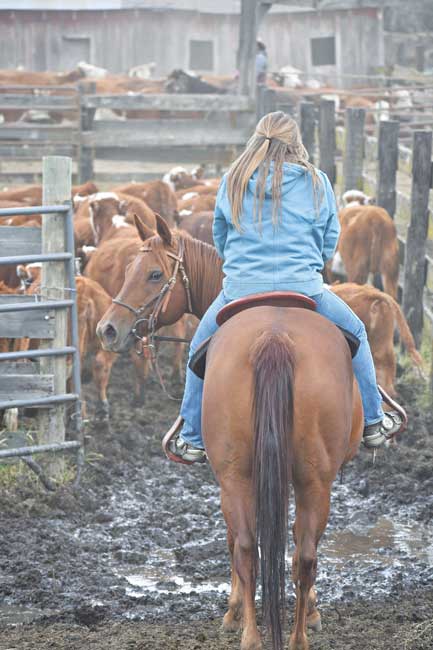Article and photo by Elsie Eide Kelly
Women are doing the cowboys’ job in increasing numbers across what’s left of the west. Long days in and out of the saddle gathering and pushing stubborn cattle through pastures and into corrals for branding or doctoring makes a person tough, resilient and wholly in touch with life at its most basic. Cowboys have done it for hundreds of years. Now the new face is feminine.
Girls have always loved horses and riding. Now they get the chance to prove their abilities on ranches around the county. Men are leaving the saddle for jobs that aren’t as dangerous and pay more. Women are embracing the opportunity to ride wild and free and are more willing than ever before to take on these dangerous jobs. It also helps that they are being hired, partly because there’s a shortage of available, good cowboys and also these women are willing to put their reputations on the line for this work. And, some of them actually run their own ranches and do much more than only time in the saddle. And, most of them are raising kids, too, often alone.
Now women are getting to hone their riding skills on the open range moving cattle, that don’t want to be moved, into rugged new pastures when the grasses have been grazed down in the old ones. But there’s also the hard work inside the corrals when cattle are brought in for doctoring, ear tagging and weaning. It’s easy to get slammed into the fences by a cow-driven gate and your body bruised or bones broken. It happens. But, like cowboys in the past, they don’t believe it will happen to them. They are cautious for the most part and, although exhausted by the end of the day, consistently maintain a vigilant outlook as each day wears on.
The wild, wild west still exists and if you ride out after cows you know damned well that it does. You prepare for anything to happen. Number one rule: carry water. What if your horse goes down into a huge badger hole that was hidden by sagebrush (true story). He’s stuck until the rest of the crew figures out you’re missing and comes with ropes to drag his ass out of that hole so you can ride him carefully back to the corrals for a complete check up. You just might need that water you brought along while you’re waiting all those hours. Then, next day, one of the crew has to be taken to the hospital with possible concussion when her horse stumbles through a rock outcropping and goes down for the count. It’s always best to ride with a partner but not always possible. That’s life on the open range.
The horses are every bit as tough as the women who ride them. They’re bred for this rough country which means they are bred to be sure-footed, highly trainable, calm and intelligent. You really want to ride a horse who’s afraid to hurt himself. He won’t get you in trouble because he’s smart enough to know when to slow down. He watches where he’s going. He senses trouble before you can. He does it by reading the vibrations through his feet. They come up from the ground with clues to footing that’s becoming too soft or too variable for sure footing at a gallop. He’s your partner and friend. The bond between these horses and the women who ride them is one of extreme trust, each in the other. You can’t do this job any other way, or with an ordinary horse.
When they ride out, these women know how serious the job is. Sometimes your colt is so green that you’re teaching him to follow your commands at the same time you’re trying to hunt for elusive cattle. As they say in the military it can be a Charlie Foxtrot. But, no matter what it turns out to be, you have to ride through it and bring in the cows. There’s just no other way to do it in the wild scablands of Lincoln County. ATVs are seldom used or used in a limited way due to the geography of the Washington Channeled Scablands. One stretch you’ve got soft sand and suddenly the scab rock breaks through making footing very tricky. There are sudden canyons, cliffs and bluffs that can drop off before you realize you have to turn around. Horses make it easier to wind down through this country as it takes less of a path for them to pass. It’s often impossible to maneuver an ATV through the mazes. Horses can follow the cows anywhere.
There are a number of women who do this kind of work here. They are as different from each other as night and day. They are ranch owners, partners, managers, herdsmen, or just plain hired hands – outriders. We’re going to tell you about some of them. You’ll be astounded. There aren’t many now, possibly fewer every year. So pay attention or miss out on the tales of some extraordinary women who will be talked about in families for many generations.
Elsie is a disabled US Air Force veteran whose ranch in Lincoln County was burned down in the Labor Day Whitney wildfire of 2020. She is currently rebuilding while taking care of her horses and goats with the help of her cowgirl daughter, Rhonda Kelly.

